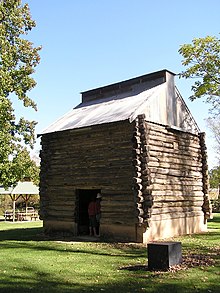kiln
Jump to navigation
Jump to search
English[edit]

Alternative forms[edit]
Etymology[edit]
From Middle English kilne, from Old English cyln, cylen, cylin (“large oven, kiln”), from Latin culīna (“kitchen, kitchen stove”).
Middle English -ln(e) usually becomes modern -ll as in mill. The pronunciation /kɪln/ may be based on dialects in which this simplification did not take place, but it must have been at least reinforced by spelling pronunciation.
Pronunciation[edit]
- (General American, Received Pronunciation) IPA(key): /kɪl(n)/
Audio (US) (file) - Rhymes: -ɪln, -ɪl
- Homophone: kill (for the pronunciation /kɪl/)
Noun[edit]
kiln (plural kilns)
- An oven or furnace or a heated chamber, for the purpose of hardening, burning, calcining or drying anything; for example, firing ceramics, curing or preserving tobacco, or drying grain.
- 2006, Edwin Black, chapter 2, in Internal Combustion[1]:
- One typical Grecian kiln engorged one thousand muleloads of juniper wood in a single burn. Fifty such kilns would devour six thousand metric tons of trees and brush annually.
Derived terms[edit]
Translations[edit]
oven, furnace or heated chamber
|
Verb[edit]
kiln (third-person singular simple present kilns, present participle kilning, simple past and past participle kilned)
- To bake in a kiln; to fire.
- When making pottery we need to allow the bisque to dry before we kiln it.
References[edit]
Further reading[edit]
Anagrams[edit]
Indonesian[edit]
Etymology[edit]
From English kiln, from Middle English kilne, from Old English cylene or cyline (“large oven”), from Latin culīna (“kitchen, kitchen stove”).
Pronunciation[edit]
Noun[edit]
kiln (first-person possessive kilnku, second-person possessive kilnmu, third-person possessive kilnnya)
- (archaeology) kiln, an oven or furnace or a heated chamber, for the purpose of hardening, burning, calcining or drying anything; for example, firing ceramics, curing or preserving tobacco, or drying grain.
Further reading[edit]
- “kiln” in Kamus Besar Bahasa Indonesia, Jakarta: Agency for Language Development and Cultivation — Ministry of Education, Culture, Research, and Technology of the Republic Indonesia, 2016.
Categories:
- English terms derived from Proto-Indo-European
- English terms derived from the Proto-Indo-European root *pekʷ-
- English terms inherited from Middle English
- English terms derived from Middle English
- English terms inherited from Old English
- English terms derived from Old English
- English terms derived from Latin
- English spelling pronunciations
- English 1-syllable words
- English terms with IPA pronunciation
- English terms with audio links
- Rhymes:English/ɪln
- Rhymes:English/ɪln/1 syllable
- Rhymes:English/ɪl
- Rhymes:English/ɪl/1 syllable
- English terms with homophones
- English lemmas
- English nouns
- English countable nouns
- English terms with quotations
- English verbs
- English terms with usage examples
- en:Combustion
- Indonesian terms borrowed from English
- Indonesian terms derived from English
- Indonesian terms derived from Middle English
- Indonesian terms derived from Old English
- Indonesian terms derived from Latin
- Indonesian terms with IPA pronunciation
- Indonesian lemmas
- Indonesian nouns
- Requests for plural forms in Indonesian entries
- id:Archaeology